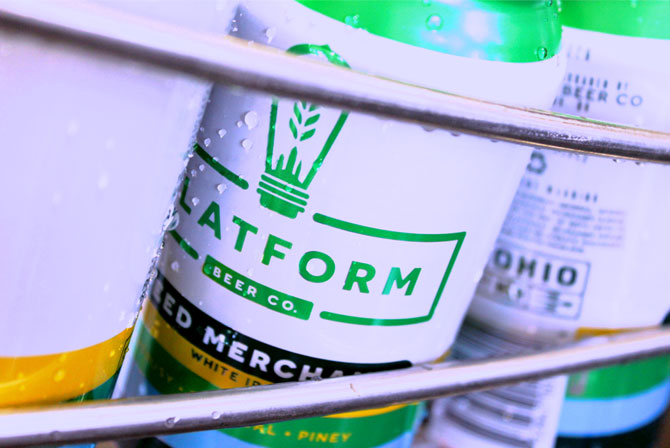
Aiming to establish a deeper connection in one of the key out-of-state markets where it distributes, fast-growing Ohio brewery Platform Beer Co. has announced plans open a brewery and taproom in Pittsburgh later this year.
In addition to Platform’s existing facilities in Cleveland — where it has a production brewery and a dedicated sour facility — and taproom in Columbus, Ohio, the company will soon be operating five locations across two states.
The forthcoming Pittsburgh facility is the company’s first outside of Ohio.
Platform is also slated to open LOCOBA (Local Coffee Barrels) in Cincinnati’s Over-the-Rhine neighborhood during the week of January 28, nearly one year after the project was first announced.
Additionally, the company is planning to open a tasting room at its existing 10,000 sq. ft. sour beer facility in Cleveland, dubbed the Phunkenship, during the spring of 2019.
Platform co-owner Paul Benner told Brewbound that taprooms are a “core” part of the company’s business model and have been a “key driver” of its success over the last four years.
“It’s a sales tool; it’s the face of our company in all of our markets,” he said.

Last year, taproom sales accounted for 20 percent of Platform’s revenue, up 10 percent from 2017, Benner said. With three new locations coming online in 2019, he expects continued growth of the company’s taproom business.
Benner called Pittsburgh “a natural fit” for expansion due to strong sales results in the six months since it began distributing beer in the state.
“It’s been a really, really great performing market and a phenomenal response from the customer base there,” Benner said.
The decision to open a taproom in Pittsburgh is aimed at strengthening its sales in on- and off-premise accounts, Benner added.
Platform co-owner Justin Carson said the company expects to produce as much as 3,000 barrels on-site in Pittsburgh, and it will also install a canning line in order to fuel off-site distribution and on-site, direct-to-consumer sales.
Meanwhile, Platform’s soon-to-open Cincinnati facility will serve as a hybrid coffee shop, brewery taproom and barrel-aging facility, Carson said.
“[It’s] a different twist on a tasting room where we’re able to highlight multiple beverage opportunities within the tasting room,” he said.

Benner and Carson acknowledged that they’re entering two highly competitive beer markets, but they believe their taprooms in those markets can succeed by becoming a part of the local community. Those local bonds, they added, have been strengthened through collaborating with local breweries.
As for the Phunkenship in Cleveland, the facility has not previously been open to the public. Platform has been producing sour beer at the location since March 2018, and the 10,000 sq. ft. space now houses about 2,000 barrels of beer aging in wood.
Beyond taproom expansions, Benner and Carson said Platform’s goal for 2019 is to increase production to 40,000 barrels.
“We actually think we’ve taken a pretty conservative approach to our projection model,” Benner said.
Last year, Platform sales increased 32 percent, and the company brewed about 27,000 barrels of beer, up from around 17,000 barrels in 2017. The company has grown steadily since opening in 2014, when it produced just 460 barrels of beer.
Benner said he believes there is a lot of “white space” to grow in its home state, where the company sells about 85 percent of its beer. Platform’s offerings are currently sold in about half of Ohio’s multi-outlet off-premise retailers that are tracked by market research firm IRI, he added.

In Ohio’s five major markets — Cleveland, Akron/Canton, Columbus, Dayton, and Cincinnati — Platform self-distributes its beer. Benner said Platform’s self-distribution business accounts for 80 percent of the company’s beer sold to on- and off-premise retailers.
Outside of Ohio, Platform sells beer in six states — Pennsylvania, New York, New Jersey, Connecticut, Kentucky and Indiana. Benner said the company may expand distribution within those states “as it makes sense,” however, it is not planning to expand into new markets this year.
“With investments in our sales chain in Ohio and abroad, coupled with capacity going to supply growing tasting rooms, we don’t expect a need for major expansion of our distribution network into new states in 2019,” Benner said.
The Platform portfolio features just two year-round offerings — New Cleveland Palesner, a pilsner-pale ale hybrid, and Speed Merchant White IPA. Those beers accounted for about 40 percent of the company’s sales in 2018. The remainder comes from more than 80 unique canned beers across its two locations, including a rotating series of New England-style IPAs, kettle sours and seasonal offerings.

In December, Platform launched a year-round hard seltzer brand featuring a rotating flavors, and the reception from retailers has been strong, according to Carson. Prior to launching, Platform pre-sold more than 2,400 case equivalents of its first flavor, Black Cherry (5 percent ABV, 110 calories).
Benner and Carson said they believe there is an opportunity for a local seltzer to succeed in the market, and they wanted to proactively establish the brand prior to the spring and summer selling periods.
“We’ve seen great pull through with it,” Carson said. “The volumes were pretty dramatic even in the lower-volume first quarter.”